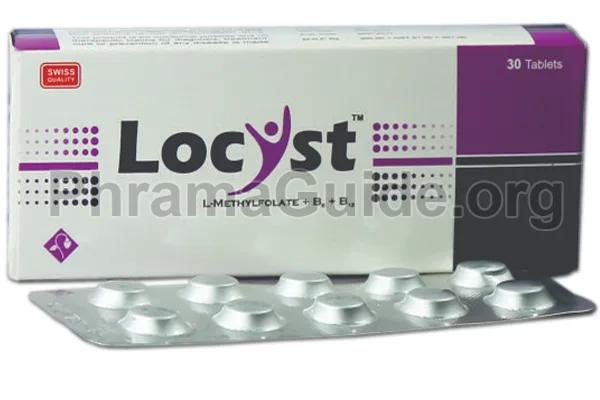Locyst is the combination of L-methyl folate (a form of folate), that plays important roles in various bodily functions. It is generally considered safe when taken as recommended. Even then it can cause some common and less common side effects.
Common Side Effects
- Gastrointestinal Issues: Locyst may cause mild digestive disturbances such as nausea, upset stomach, or diarrhea. These symptoms are typically mild and temporary.
- Allergic Reactions: In rare cases with the use of Locyst, individuals may experience allergic reactions to any of the components in the combination. Symptoms may include itching, rash, hives, swelling, or difficulty breathing.
- Headache: Some people may experience mild headaches when taking Locyst.
Less Common Side Effects
- Nervous System Issues: High doses of Locyst may lead to neurological symptoms like numbness, tingling, and sensory disturbances. This condition is known as peripheral neuropathy.
- Skin Reactions: Rarely, Locyst can cause skin reactions or photosensitivity.
- High Blood Pressure: High doses of Locyst may lead to an increase in blood pressure.
- Hypersensitivity Reactions: Although rare, some individuals may experience hypersensitivity or intolerance reactions to Locyst. Symptoms can include skin rashes, gastrointestinal discomfort, and headaches.
- Changes in Blood Sugar Levels: Locyst can affect blood sugar levels in individuals with diabetes. Close monitoring of blood sugar may be necessary.
- Polycythemia: Locyst may lead to increased red blood cell production, a condition known as polycythemia. This is a rare side effect.

What is Locyst?
Locyst is one of the leading brands of L-methylfolate, vitamin B6, and B12, manufactured and marketed by RG Pharmaceutica (Pvt) Ltd, Pakistan.
Locyst : Available Formulations and Strengths
Presently, Locyst is available in Tablet form.
Locyst Tablet : 400mcg strength.
What Are The Possible Drug Interactions of Locyst?
- Medications that Interfere with Locyst: Proton pump inhibitors (PPIs) and H2-receptor antagonists, commonly used to treat acid reflux and ulcers, may interact with Locyst and reduce its absorption.
- Metformin: Metformin, a medication commonly used to manage type 2 diabetes, can interfere with Locyst absorption.
- Antiepileptic Medications: Some antiepileptic drugs, such as phenytoin, phenobarbital, and primidone, can interfere with vitamin B6 metabolism (an active ingredient of Locyst).
- Levodopa: Levodopa, a medication used to treat Parkinson’s disease, can interact with Locyst and reduce its effectiveness. Some healthcare providers recommend taking levodopa and Locyst at different times to avoid this interaction.
- Chloramphenicol: Chloramphenicol, an antibiotic, can reduce the effectiveness of Locyst.
- Other Medications: High-dose Locyst may interact with certain medications, such as isoniazid, cycloserine, and hydralazine, leading to potential side effects or reduced medication efficacy.

Leave A Comment